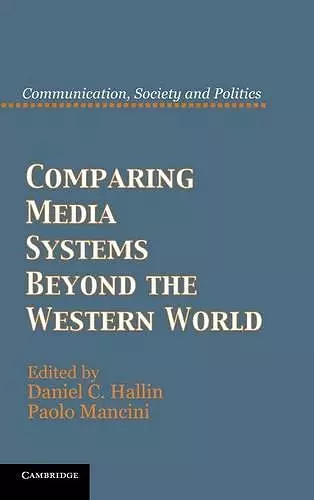Comparing Media Systems Beyond the Western World
Paolo Mancini editor Daniel C Hallin editor
Format:Hardback
Publisher:Cambridge University Press
Published:5th Dec '11
Currently unavailable, and unfortunately no date known when it will be back
This hardback is available in another edition too:
- Paperback£26.99(9781107699540)

This book explores the relation between media and political systems in a wide range of non-Western contexts.
Comparing Media Systems Beyond the Western World explores the relation between media and political systems in a wide range of non-Western contexts, analyzing the variety of ways in which media interact with the state and with various political actors and the roles journalists play in these relationships.Comparing Media Systems Beyond the Western World offers a broad exploration of the conceptual foundations for comparative analysis of media and politics globally. It takes as its point of departure the widely used framework of Hallin and Mancini's Comparing Media Systems, exploring how the concepts and methods of their analysis do and do not prove useful when applied beyond the original focus of their 'most similar systems' design and the West European and North American cases it encompassed. It is intended both to use a wider range of cases to interrogate and clarify the conceptual framework of Comparing Media Systems and to propose new models, concepts and approaches that will be useful for dealing with non-Western media systems and with processes of political transition. Comparing Media Systems Beyond the Western World covers, among other cases, Brazil, China, Israel, Lebanon, Lithuania, Poland, Russia, Saudi Arabia, South Africa and Thailand.
“This is a most welcome sequel to the editors’ widely acclaimed and often cited Comparing Media Systems (2004). Whereas that earlier work derived three models of political communication systems, including four dimensions along which they could be compared, from analysis of 18 advanced capitalist democracies in Western Europe and North America, this publication branches out, ambitiously and insightfully, into other parts of the democratic world, including Eastern Europe, the Middle East, Latin, America, Asia and Africa. It is based on academic experts’ case studies of the countries concerned, which consistently attain high standards of empirical and conceptual presentation. The results provide a rich mix of confirmation and critique of Hallin and Mancini’s original framework plus ideas for other models, including hybridized ones. This book will arouse much interest, advance comparative understanding, and provoke debate.”—Jay Blumler, University of Leeds
“Few other books in the field of communication have left a deeper impact than Hallin and Mancini’s Comparing Media Systems. This immensely thoughtful followup publication debates the usefulness of their typology to cases outside the scope of their original analysis. It is a rare and impressive example of conceptual improvement and broader integrative theorizing in the still-young literature on comparative communication. This volume proves how theoretical exchange between scholars from diverse national backgrounds and divergent schools of thought can contribute substantially to comparative theory-building. The intention of this volume is not to institutionalize a single conceptual framework, but to establish a broad, multi-perspectival tradition of comparative analysis. It is highly successful and elevates the comparative study of media systems to a new level."—Frank Esser, University of Zürich
“Hallin and Mancini’s dialogue between the ‘most dissimilar systems’ of the non-Western world and the ‘most similar systems’ of the Western world is a seminal contribution to comparative media studies.”—Chin-Chuan Lee, City University of Hong Kong
“This book is an intelligent and thoughtful expansion of the seminal framework developed in Comparing Media Systems to media systems beyond the western world. Hallin and Mancini have convened an impressive group of authors who challenge, refine, and occasionally reject, their framework through a combination of detailed case studies of some key countries and comparative overviews. The book represents a bold and intellectually exciting enterprise in the area of comparative media research. It will be of interest to social scientists and to media and journalism scholars seeking to understand media systems and the linkages to media practice beyond Europe and North America.”—David A. L. Levy, Director, Reuters Institute for the Study of Journalism, University of Oxford
ISBN: 9781107013650
Dimensions: 229mm x 152mm x 24mm
Weight: 690g
356 pages